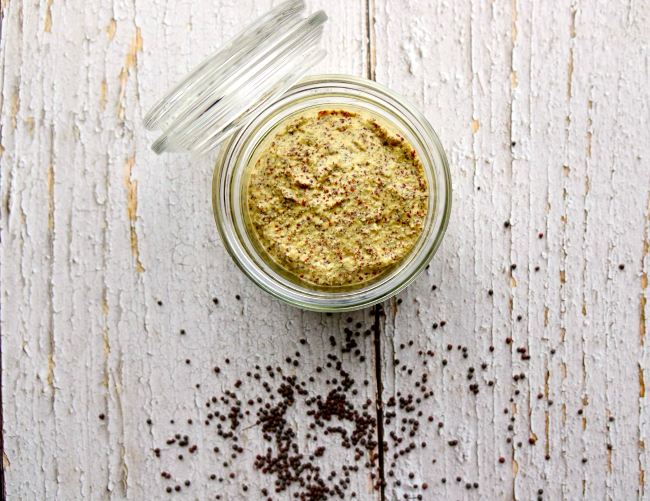

Want that classic tangy kick? This easy homemade Dijon mustard recipe shows you exactly how to make Dijon mustard right in your own kitchen. Using just a few core ingredients like mustard seeds and white wine (or vinegar), you can create a gourmet condiment far superior to store-bought versions. Also, Dijon Mustard, an ancient condiment that effortlessly elevates your dishes. It is considered mustard came to Europe from Asia. However, only in Dijon city of Eastern France were they able to create the mustard recipe that later conquered the whole world.
- Servings 10
- Prep time 12min
- Prep time 8-10 hrs
- Calories: 43 kcal
- Protein: 1.6 g
- Fat: 2.2 gm
- Saturated Fat: 0.2 g
- Carbohydrates: 2.7 g
- Dietary Fiber: 0.8 g
- Sugars: 1.1 g
- Sodium: 33 mg
- Half a cup of white vinegar
- Half a cup of dry white wine
- Three tbsp. of brown and three tbsp. of black mustard seeds.
- A pinch of salt.
- One tsp. of honey (optional)
- Measuring cups
- Measuring spoons
- Mixing bowl
- Whisk
- Blender or food processor
- Glass jar or container for storage
- Place mustard seeds into glassware, and pour in vinegar and wine.
- Cover with a thick cling film and leave to stay for a day or overnight at room temperature. All components must be “soaked” in the aromas of each other.
- Next, transfer the contents of the container to a mixer, add salt, add sugar if desired, and beat until a pasty substance appears.
- Pour the mass into a clean glass container, tighten the lid, and place it in the refrigerator.
- You can taste ready mustard seasoning after 12 hours. The longer it is stored, the more tender it will be. However, this mustard can stay in a refrigerator for three months.
- Mustard Seed Selection: Use brown or black seeds for an authentic Dijon Mustard taste.
- Blending Consistency: Blend the soaked seeds with vinegar to achieve the desired consistency. For a coarse mustard, blend less; for a smoother texture, blend more.
- Wine Choice: opt for good-quality white wine if using wine in your recipe. This contributes to the distinct Dijon flavor profile. Water or apple cider vinegar can be used instead if you prefer a non-alcoholic version.
- Balancing Flavors: Incorporate a touch of sweetness with honey to balance the pungency of the mustard seeds and vinegar.
- Aging and Maturing: Allow your mustard to mature in the fridge for a few days before using it. This gives the flavors time to develop, resulting in a richer taste.
- Storage: Store your homemade Dijon Mustard in a sealed glass jar in the refrigerator for two-three weeks.
- Sandwiches and Burgers: Dijon mustard adds a sophisticated twist to sandwiches and burgers. Spread it on bread or buns to enhance the flavor of deli meats, cheeses, and vegetables. It pairs exceptionally well with roast beef, turkey, ham, and grilled chicken.
- Salad Dressings: Dijon mustard is a common ingredient in vinaigrettes. Its acidity and depth of flavor can balance the oiliness of dressings, creating a harmonious blend that complements salads made with greens, vegetables, fruits, and even proteins like grilled shrimp or chicken.
- Marinades and Glazes: The tangy and slightly spicy nature of Dijon mustard makes it an excellent choice for marinades and glazes. It works wonderfully with meats like pork, lamb, and salmon, infusing them with flavor when grilled, roasted, or broiled.
- Roasted Vegetables: Roasted vegetables like Brussels sprouts, carrots, and potatoes take on a new dimension when tossed with a mixture of Dijon mustard, olive oil, and herbs. The mustard’s zesty flavor can cut through the richness of the vegetables, enhancing their taste.
- Sauces: Dijon mustard is a key ingredient in numerous sauces. It can be the base for creamy dressings, sandwich spreads, and dips. Adding to pan sauces or gravies contributes depth and tanginess that complements meats and poultry.
- Charcuterie and Cheese Boards: Dijon mustard is a delightful accompaniment to charcuterie and cheese boards. Its robust flavor pairs well with cured meats like salami and prosciutto, as well as a variety of cheeses, from creamy brie to sharp cheddar.
- Eggs: Elevate your breakfast or brunch by incorporating Dijon mustard into your egg dishes. It can be blended into scrambled eggs, omelets, or quiches to provide a subtle kick and enhance the overall flavor.
- Grilled Meats: Dijon mustard is an excellent rub or marinade ingredient for grilled meats. It can be mixed with herbs, garlic, and olive oil to create a flavorful coating that adds complexity to steaks, chops, and skewers.
- Fish and Seafood: Dijon mustard complements the natural flavors of fish and seafood. It can be brushed onto fillets before baking or broiling, creating a tangy crust that seals in moisture.
